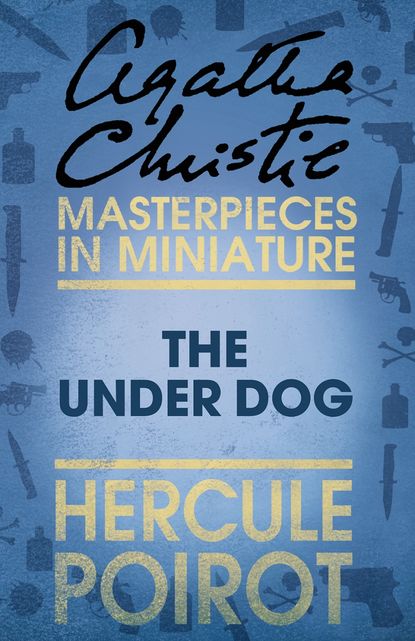По всем вопросам обращайтесь на: info@litportal.ru
(©) 2003-2024.
✖
The Under Dog: A Hercule Poirot Short Story
Автор
Год написания книги
2018
Настройки чтения
Размер шрифта
Высота строк
Поля
‘He was your husband’s nephew, I understand, not yours.’
‘Yes, Charles was the only son of Reuben’s sister. She married a comparatively rich man, but one of those crashes came – they do, in the city – and he died, and his wife, too, and Charles came to live with us. He was twenty-three at the time, and going to be a barrister. But when the trouble came, Reuben took him into his office.’
‘He was industrious, M. Charles?’
‘I like a man who is quick on the uptake,’ said Lady Astwell with a nod of approval. ‘No, that’s just the trouble, Charles was not industrious. He was always having rows with his uncle over some muddle or other that he had made. Not that poor Reuben was an easy man to get on with. Many’s the time I’ve told him he had forgotten what it was to be young himself. He was very different in those days, M. Poirot.’
Lady Astwell heaved a sigh of reminiscence.
‘Changes must come, Madame,’ said Poirot. ‘It is the law.’
‘Still,’ said Lady Astwell, ‘he was never really rude to me. At least if he was, he was always sorry afterwards – poor dear Reuben.’
‘He was difficult, eh?’ said Poirot.
‘I could always manage him,’ said Lady Astwell with the air of a successful lion tamer. ‘But it was rather awkward sometimes when he would lose his temper with the servants. There are ways of doing that, and Reuben’s was not the right way.’
‘How exactly did Sir Reuben leave his money, Lady Astwell?’
‘Half to me and half to Charles,’ replied Lady Astwell promptly. ‘The lawyers don’t put it simply like that, but that’s what it amounts to.’
Poirot nodded his head.
‘I see – I see,’ he murmured. ‘Now, Lady Astwell, I will demand of you that you will describe to me the household. There was yourself, and Sir Reuben’s nephew, Mr Charles Leverson, and the secretary, Mr Owen Trefusis, and there was Miss Lily Margrave. Perhaps you will tell me something of that young lady.’
‘You want to know about Lily?’
‘Yes, she had been with you long?’
‘About a year. I have had a lot of secretary-companions you know, but somehow or other they all got on my nerves. Lily was different. She was tactful and full of common sense and besides she looks so nice. I do like to have a pretty face about me, M. Poirot. I am a funny kind of person; I take likes and dislikes straight away. As soon as I saw that girl, I said to myself: “She’ll do”.’
‘Did she come to you through friends, Lady Astwell?’
‘I think she answered an advertisement. Yes – that was it.’
‘You know something of her people, of where she comes from?’
‘Her father and mother are out in India, I believe. I don’t really know much about them, but you can see at a glance that Lily is a lady, can’t you, M. Poirot?’
‘Oh, perfectly, perfectly.’
‘Of course,’ went on Lady Astwell, ‘I am not a lady myself. I know it, and the servants know it, but there is nothing mean-spirited about me. I can appreciate the real thing when I see it, and no one could be nicer than Lily has been to me. I look upon that girl almost as a daughter, M. Poirot, indeed I do.’
Poirot’s right hand strayed out and straightened one or two of the objects lying on a table near him.
‘Did Sir Reuben share this feeling?’ he asked.
His eyes were on the knick-knacks, but doubtless he noted the pause before Lady Astwell’s answer came.
‘With a man it’s different. Of course they – they got on very well.’
‘Thank you, Madame,’ said Poirot. He was smiling to himself.
‘And these were the only people in the house that night?’ he asked. ‘Excepting, of course, the servants.’
‘Oh, there was Victor.’
‘Victor?’
‘Yes, my husband’s brother, you know, and his partner.’
‘He lived with you?’
‘No, he had just arrived on a visit. He has been out in West Africa for the past few years.’
‘West Africa,’ murmured Poirot.
He had learned that Lady Astwell could be trusted to develop a subject herself if sufficient time was given her.
‘They say it’s a wonderful country, but I think it’s the kind of place that has a very bad effect upon a man. They drink too much, and they get uncontrolled. None of the Astwells has a good temper, and Victor’s, since he came back from Africa, has been simply too shocking. He has frightened me once or twice.’
‘Did he frighten Miss Margrave, I wonder?’ murmured Poirot gently.
‘Lily? Oh, I don’t think he has seen much of Lily.’
Poirot made a note or two in a diminutive note-book; then he put the pencil back in its loop and returned the note-book to his pocket.
‘I thank you, Lady Astwell. I will now, if I may, interview Parsons.’
‘Will you have him up here?’
Lady Astwell’s hand moved towards the bell. Poirot arrested the gesture quickly.
‘No, no, a thousand times no. I will descend to him.’
‘If you think it is better –’
Lady Astwell was clearly disappointed at not being able to participate in the forthcoming scene. Poirot adopted an air of secrecy.
‘It is essential,’ he said mysteriously, and left Lady Astwell duly impressed.
He found Parsons in the butler’s pantry, polishing silver. Poirot opened the proceedings with one of his funny little bows.
‘I must explain myself,’ he said. ‘I am a detective agent.’
‘Yes, sir,’ said Parsons, ‘we gathered as much.’
His tone was respectful but aloof.

















